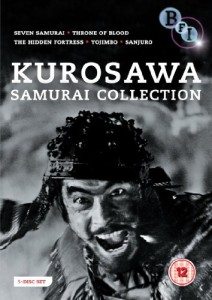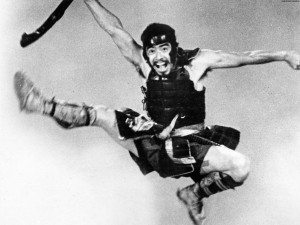Akira Kurosawa – The Samurai Collection
The BFI has recently released ‘Akira Kurosawa – The Samurai Collection’ on Blu-ray which includes his seminal works: Seven Samurai, Throne of Blood, Hidden Fortress, Yojimbo and Sanjuro. The collection is a visual feast from the pioneering filmmaker that influenced an extraordinary number of directors to this day. Kurosawa cemented himself in film history with masterworks that truly exemplify the scope and impact of action and adventure films. Each one of the films stars legendary actor Toshiro Mifune who helped to form an actor-director partnership that out-rivals some of the best. To the unaware, samurai cinema is usually seen as the eastern equivalent of the traditional Western. Replace gun-slinging cowboys with sword-wielding ronin and you can imagine the appeal of an action adventure romp set amidst a period-setting backdrop.
Kurosawa’s famed epic Seven Samurai was one the first samurai films to be internationally acclaimed by critics and audiences alike. It was simple as to why: the film included innovative filmmaking on all fronts. The immense breadth of the storytelling coupled with a host of iconic character archetypes and relationships set the bar so high that you can still find its fingerprints in most modern thriller/action/war films. The film entails an, at the time, uncommon plot: a group of farmers employing a host of masterless samurai to fight against a gang of bandits. Even if these people are from a rather alien environment and obey laws completely foreign to us, the plight of the farmers seems as understandable as anything in this country’s troubled history.
Kurosawa’s famed epic Seven Samurai was one the first samurai films to be internationally acclaimed by critics and audiences alike. It was simple as to why: the film included innovative filmmaking on all fronts.
Throne of Blood sees a retelling of Shakespeare’s Macbeth without any of his words but all the haunting imagery as Kurosawa ditches two witches and remoulds the tragic story into feudal Japan. While known for boisterous performances, lead Toshiro Mifune is able to to portray the man’s intense vulnerability and madness to extraordinary lengths. The last scene showing his horrific demise is the perfect testament to a man’s misguided intentions. This film really cemented the portrayal of a flawed protagonist in one of the best dramatisations of Shakespeare’s work, matched once again by Kurosawa’s adaptation of King Lear in the 1985 epic Ran.
Hidden Fortress starts with the viewpoint of a couple of dirty and disheveled peasants, and continues with them all the way through this save-the-princess-adventure despite their imperfections. Even if it was impossible to root for them, this structure was a great platform for some really entertaining storytelling that most other filmmakers wouldn’t have dare touched. To the delight of many sci-fi fans, its influence on George Lucas ended up producing a couple of hapless and lovable droids. But Lucas is quick to interject in an included interview that Princess Leia is nothing like the one in this castle.
The impact Yojimbo had on the animated series Samurai Jack, let alone The Dollars Trilogy by Sergio Leone proves its legacy as unbelievable entertainment. It boasts the creation of ‘the lone hero silhouetted against the wide frame’ and its fantastic cinematography builds effective and memorable action sequences. Mifune provides some reel bravado as the bodyguard being pulled from two competing crime lords in a small town. I guess no one could have foreseen that a man with no name could truly be the epitome of cool.
And just as For A Few Dollars More was the result of the great response of A Fistful of Dollars, Sanjuro was born from the success from Yojimbo. Mifune continues as the same lone wolf muddled in another group of people’s problems purely by chance. Both Sanjuro and Yojimbo are widely regarded as Kurosawa’s most entertaining films and it easy to see why. He sets up the heroes and villains with clear intentions and then has them blur into intricate back-and-forth scheming and violence. And what Sanjuro lacks in bullets and daggers compared to the final showdown in Yojimbo, it more than makes up for with a gut-punching duel like no other. Yojimbo and Sanjuro would undoubtedly be a great introduction to Akira Kurosawa for any sceptics of old black and white samurai films.
Header Image Source, Image 1, Image 2



Comments